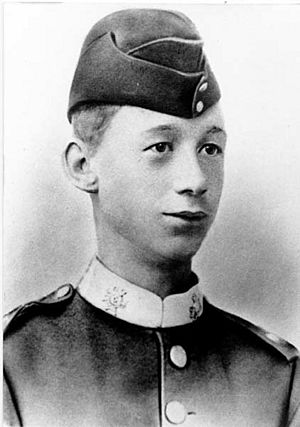Jacob Rivers facts for kids
Quick facts for kids
Jacob Rivers
|
|
|---|---|
 |
|
| Born | 17 November 1881 Derby, Derbyshire, England |
| Died | 12 March 1915 (aged 33) † Neuve Chapelle, France |
| Allegiance | |
| Service/ |
British Army |
| Years of service | 1899–1907 1914–1915 |
| Rank | Private |
| Service number | 6016 |
| Unit | Sherwood Foresters |
| Battles/wars | First World War † |
| Awards | Victoria Cross |
Jacob Rivers was a brave soldier from England. He was born in Derby on November 17, 1881. He is famous for receiving the Victoria Cross (VC). This is the highest award for bravery a soldier can get. It is given to British and Commonwealth forces. He earned this award during the First World War for his amazing courage in France. Sadly, he died in battle in March 1915.
Contents
Jacob Rivers' Early Life
Jacob Rivers was born in Derby, England. He was one of seven children. Not much is known about his childhood. In June 1899, he joined the British Army. He served for seven years, mostly in British India and Burma. He left the army in 1907 but remained a military reserve.
After his first time in the army, Rivers worked for the Midland Railway. He worked there from June 1911 until August 1914.
Fighting in the First World War
The First World War began for Britain in August 1914. At this time, Jacob Rivers was working for the Midland Railway Company. He worked on a train that carried ballast. He decided to join the British Army again. He became part of the 1st Battalion of The Sherwood Foresters. By the end of 1914, his regiment was fighting on the Western Front in France. They were part of the 8th Division.
The Battle of Neuve Chapelle
In early 1915, Rivers' division was part of a big attack. The goal was to break through German lines in Neuve Chapelle, France. The attack started on March 10, 1915. Rivers' battalion was first held in reserve. They were sent into action the next day. They had to move towards the village of Pietre.
Their movement stopped because of German machine-gun posts. The soldiers had to dig into the ground for safety.
A Heroic Act
On March 12, the Germans launched a counterattack. Rivers' battalion was in great danger. Jacob Rivers bravely moved towards the German position. He threw several bombs at them. This forced the German soldiers to retreat. His actions helped his fellow soldiers.
Later that same day, he showed great bravery again. He attacked another German position in the same way. He forced the enemy to retreat once more. Sadly, during this second act of bravery, he was killed.
For his amazing courage, he was given the Victoria Cross. This award was created in 1856. It is the highest award for bravery in the British Empire. The official report said he showed "most conspicuous bravery." It noted how he "hurled bombs" at the enemy. His actions made the enemy "retire, and so relieved the situation."
Jacob Rivers was buried in a battlefield grave. This grave was later lost. He is remembered at the Le Touret Memorial in France.
The Victoria Cross Medal
King George V gave Jacob Rivers' Victoria Cross to his mother. This happened on November 29, 1916. The ceremony took place at Buckingham Palace. When his mother passed away in 1937, the medal was given to his regiment. Today, the Victoria Cross is on display. You can see it at the Sherwood Foresters Museum in Nottingham.
In 2010, a special memorial was unveiled. It is called The Nottingham Castle Victoria Cross Memorial. It lists Jacob Rivers among the 20 VC recipients from Nottinghamshire. On March 12, 2017, a plaque was put up to remember Rivers. It is on platform 1 of Derby railway station. This was 102 years after his death.
 | William M. Jackson |
 | Juan E. Gilbert |
 | Neil deGrasse Tyson |

